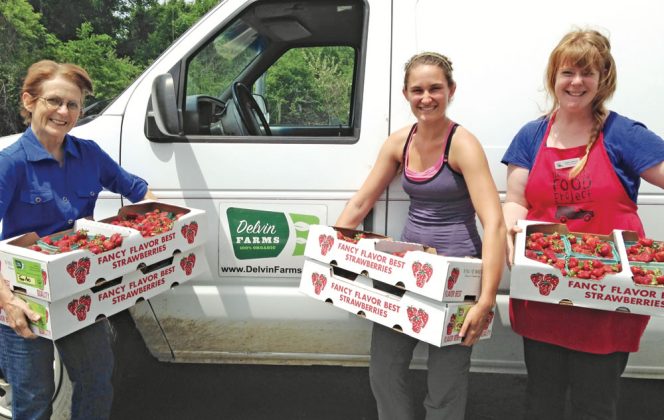About 15 percent of Tennessee households are food insecure, and almost 1.2 million tons of food are landfilled annually. The state is moving quickly to address both realities. Part I
Ashley Cabrera
BioCycle August 2017
It is increasingly apparent that food waste and food insecurity in the United States is a problem, and it has especially hit home in Tennessee. An estimated 15.1 percent of Tennessee households are food insecure, which translates to over 400,000 homes and 1,016,420 people. The national average of food insecure households is at 13.7 percent. The top counties in Tennessee with the highest food insecurity rates are Haywood, Lauderdale, Shelby, Hardeman, and Lake counties, all in western Tennessee.
In Tennessee, approximately 1,193,001.91 tons/year of food are landfilled — 21.6 percent of all waste disposed in the state. This wasted food (edible and nonedible) releases methane as it decomposes. Added to that are the wasted water, energy, agricultural chemicals, labor, and other resources to grow, store, and transport the food. Part I of this article provides an overview of policies and programs in Tennessee that impact food recovery and donation. Part II focuses on case studies.
Donation Law And Tax Incentives
Donation Law: Many opportunities exist to divert food from the landfill and feed people. However one obstacle is the fear of a lawsuit if a food donation were to make someone sick. The Federal Bill Emerson Good Samaritan Act provides a baseline of protection for food donors. It covers individuals, businesses, nonprofit organizations, officers of businesses and nonprofit organizations, and gleaners. To be protected under this law, donors and distributors must meet four requirements: Food must be donated to a nonprofit organization; food must meet federal, state and local quality and labeling requirements; nonprofit organization must distribute the donated food to individuals in need; and individuals receiving the food may not pay for it.
In Tennessee, food donors are protected if they give in good faith and follow similar requirements. One big difference between the federal and Tennessee’s requirements is that a charitable or nonprofit organization must operate a food bank or on-site feeding program, established to combat poverty and hunger. Any injury or illness resulting from the condition of the food donation cannot be a result of the donor or organization’s negligence, recklessness or intentional misconduct. None of these laws protect food that is donated from one individual to another in need.

The Nashville Food Project (TNFP) brings people together to “grow, cook and share nourishing food, with the goals of cultivating community and alleviating hunger.” Delvin Farms shown donating strawberries to the TNFP. Photo courtesy of The Nashville Food Project
Local Initiatives
The Nashville Food Waste Initiative
In 2015, Nashville was chosen by the Natural Resources Defense Council (NRDC) to be the pilot city for developing local policies and on-the-ground actions to address food waste, creating the Nashville Food Waste Initiative (NFWI). Since then the NFWI has been working with local businesses and households to evaluate the amount of food wasted, and developed kitchen diaries and surveys for residents to figure out the underlying causes of the food waste. It utilizes the LeanPath software to help restaurants track their food waste. This software enables restaurants and businesses to record food that is placed in the trash and organics bins and log the type of food and reason for loss. The program then calculates the estimated value of the food being tossed out and emails an alert to participating restaurants. Waste data is presented to adjust purchasing, production, menus, or staff training, to help to cut food waste in half and translates to food cost savings of up to 6 percent. (As case study will be presented in Part II.) NFWI also cohosts screenings of the Just Eat It! A Food Waste Story, a documentary on the amount of food wasted and the reasons behind the waste.
Nashville Mayor’s Food Saver Challenge
Nashville Mayor Megan Barry has partnered with the NRDC and the NFWI to challenge Nashville area restaurants to measure their food waste, set a food waste reduction goal, and work to reduce their food waste over a three-month time frame. Fifty-six restaurants joined the Mayor’s challenge and have begun reducing the amount of food going to landfills, and helping to relieve hunger, by donating wholesome food to local nonprofits, serving over 110,000 food-insecure residents in Davidson County, Tennessee.
Nashville Food Project
The Nashville Food Project’s mission is to “bring people together to grow, cook, and share nourishing food, with the goals of cultivating community and alleviating hunger in our city.” The project grows food in its Woodmont Garden. Greens and vegetables are provided for most of the meals. The garden includes beehives and composting bins. The Wedgewood Urban Garden, located near the Tennessee State Fairgrounds has two community spaces where individual gardeners can grow food for themselves and their families, and is used for outdoor classes and workshops for gardeners and the community.
The Nashville Food Project’s kitchen brings together people of all backgrounds to prepare daily meals from recovered, donated, and garden-grown food. Currently, it serves about 3,000 meals each week, and distributes the food to several other nonprofits, after school programs, ESL (English as second language) classes, and emergency shelters, as well as through its own food truck.
Project Green Fork
Project Green Fork was founded in Memphis in 2008 by Margot McNeeley. It works with restaurants to reduce waste. Over 70 restaurants divert 362,727 gallons of food waste from the landfill. The food is composted and sent to Girls Inc. of Memphis’s Youth Farm in Frayser (TN). To promote maximum sustainability, Project Green Fork also helped the restaurants recycle over 1,300 tons of cardboard and paper, as well as plastic, glass, and aluminum.

Memphis Tilth’s Grow Memphis Community Garden program has over 60 community gardens in its network. Photo courtesy Memphis Tilth
Memphis Tilth is a nonprofit with a mission to cultivate collective action for an economically sustainable, socially equitable, and environmentally sound local food system. It is comprised of seven different programs, most addressing issues surrounding food insecurity and food waste. For example, the Bring It Food Hub’s Food Recovery has diverted thousands of pounds of food from the landfill by donating surplus food to local nonprofits, congregations, and schools. All food waste at Memphis Tilth is composted. Its Food Access & Affordability program partners with the AARP Foundation to offer Fre$h Savings, a doubling incentive program for SNAP users, at several farmers markets and Krogers around Shelby County. Memphis Tilth also has resource guides that address food access and affordability in Memphis and Shelby County. The GrowMemphis Community Garden program has over 60 community gardens in its network, many located in zip codes that are largely deemed food insecure.
Knoxville-Knox County Food Policy Council
The Knoxville-Knox County Food Policy Council is a forum for representatives of the local food system to gather information and address problems found within food production, consumption, processing, distribution, and waste disposal. It educates government officials about issues in the food system and presents them with policy recommendations, and facilitates cooperation among private, public, and nonprofit organizations. The Council monitors and evaluates the performance of Knoxville’s food system, in terms of costs, availability, accessibility, and implications for public health/economic efficiency, public awareness of food issues, and improvement of food supply and distribution network in Knoxville. It has a community garden toolkit and maps to find local farmer’s markets and community gardens.
Ashley Cabrera is a Creative Services Consultant with the Tennessee Department of Environment and Conservation’s (TDEC) Office of Sustainable Practices. Her responsibilities include working with publications and the Office’s social media pages and newsletter, providing the State Legislature with TDEC information, and assisting with creation of a food recovery program.
Correction, August 17, 2017:
New information on Nashville Food Project added.










